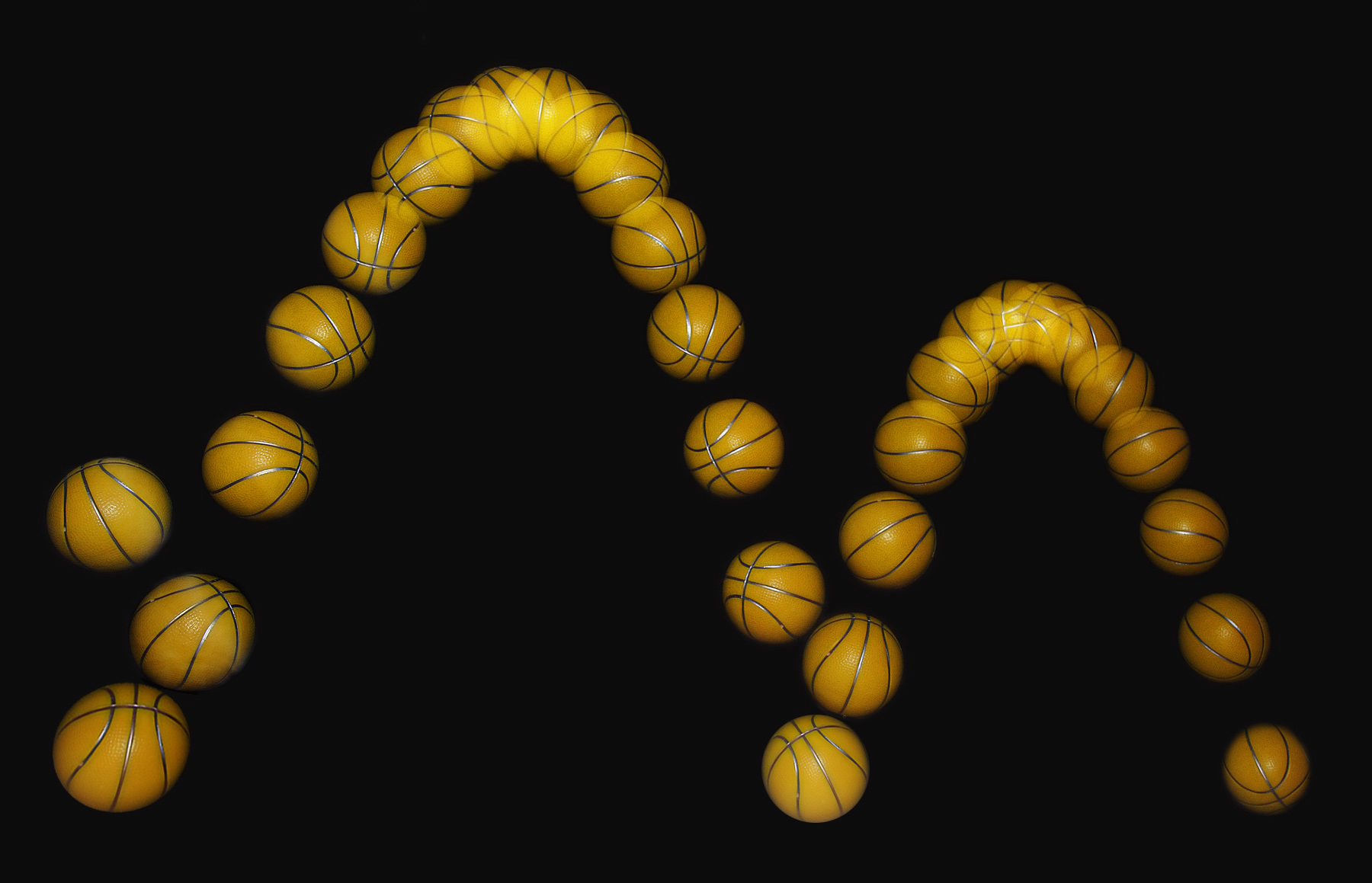Why Trust A Theory?
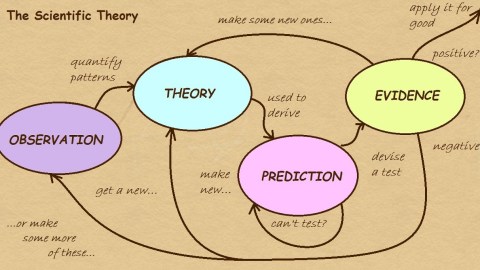
In Munich last week, physicists and philosophers debate what makes for a scientific theory. Surprisingly, no one agrees.
This piece was written by Sabine Hossenfelder. Sabine is a theoretical physicist specialized in quantum gravity and high energy physics. She also freelance writes about science.
“Did you ever read my words, or did you merely finger through them for quotations which you thought might valuably support an already conceived idea concerning some old and distorted connection between us?” –Audre Lorde
This week, a group of about 100 physicists and philosophers have gathered in Munich to reassess a question at the heart of science: “Why trust a theory?” In an opinion piece by George Ellis and Joe Silk, published in Nature earlier this year, the two physicists expressed worry about current developments in some areas of theoretical physics. In particular, they were concerned with untestable attempts to address the fundamental questions concerning space, time and matter. Their article gave rise to the idea of the current meeting.
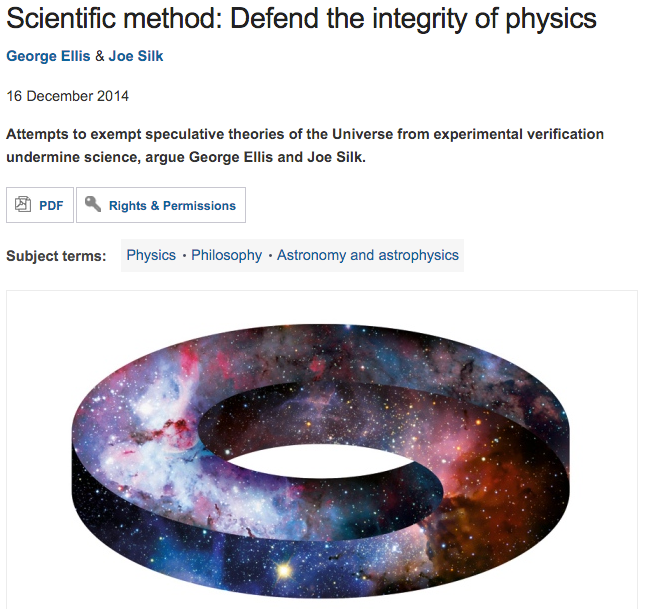
An increasing number of physicists, Ellis and Silk observed, have become strongly convinced of the viability of theories that have no empirical confirmation. This trend is most pronounced in the quest for a theory of quantum gravity — notably string theory — and in cosmology where theories for the early universe give rise to a multiverse. Why, they ask, do scientists trust theories that have not been experimentally tested? Worse, in some cases, these theories cannot even been tested in principle. Is this still science?
Philosopher Richard Dawid, one of the organizers of the Munich meeting, has observed the same development and, in his book “String theory and the scientific method” argued that string theorists in particular use a method of “non-empirical theory confirmation.” This method is used during the development of a theory and is based on collecting indications which increase the physicists’ confidence that a theory describes nature. These indications are, for example, the amount (or absence of) alternative solutions to a problem, the degree by which a theory is connected to already confirmed theories, and the amount of unexpected insights that the theories give rise to.
While Dawid focused on string theory, non-empirical theory confirmation is used and has been used in theoretical physics for a long time. What was missing so far is a legitimate philosophical underpinning. Dawid’s arguments provided such an underpinning. String theorists, needless to say, were delighted to now have philosophical support for their procedures, but not everyone was pleased to see the scientific method being watered down. This is what prompted Ellis and Silk to “defend the integrity of physics.” The topic of the present workshop is the following question: under which circumstances, if any at all, is non-empirical theory confirmation a justified procedure?
It is a pressing and timely question. As physics has matured, experimental test of new, more fundamental theories have become increasingly difficult. Many existing theories are so difficult to test that they are widely believed to be untestable in the foreseeable future. The methods from the past are not working any more. “We are in a different era of science,” says Nobel Laureate David Gross.

Gross attends the workshop to find a good strategy to continue. In particular, he is worried about the popularity of the multiverse idea, the conjecture that our universe is just one of infinitely many, each of which has different laws of physics. “I was hoping I could provoke philosophers to play a role in the discussion about the multiverse which I have qualms about,” says Gross about his motivations to attend the workshop, “Is there a danger? Is it kosher to talk about the multiverse?”
Gross’s talk launched the workshop by giving the latest update on the status of string theory, followed by Carlo Rovelli, who works on a rival program: Loop Quantum Gravity. Gross made a case that string theory is without good alternatives and that all physics known today fits in with the idea, making it a promising route to continue. Rovelli argued against it, saying that string theory has been a failure, and that the no-alternative argument is unfounded because hundreds of people work on alternatives. Instead, Rovelli indicated, the popularity of string theory has sociological reasons. He complains that the promise of Loop Quantum Gravity is not being objectively assessed. This in return offended Gross, who insisted that Loop Quantum Gravity had been evaluated decades ago, but was not considered a good approach by many.
The question of whether a scientific theory’s assessment is influenced by sociological factors is one of the running themes in this workshop. Dawid’s argument that non-empirical theory assessment captures correctly the probability of a theory being correct relies on the objective judgement of scientists. But it is an idealization, much like the idealization in contemporary economics that consumers are perfectly rational and have full information. It is not a realistic assumption, that much is clear. What is not clear though is how relevant sociological factors are.
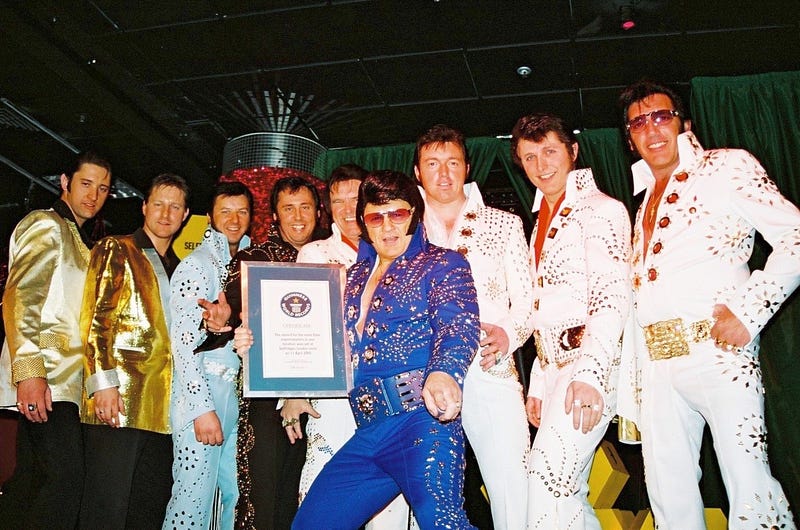
Another concern that repeatedly resurfaces is the perception of the wider public. Philosopher Massimo Pigliucci asks whether we might be headed for a new science war that could negatively affect trust in science. “This debate,” he reminds the audience “is being held publicly,” and he adds that he is livetweeting.
As Richard Dawid points out, part of the concern about the public perception is an issue of terminology. When he speaks of theory confirmation, he assures us, he means a gradual increase of confidence, not an ultimate confirmation. Rovelli, however, finds the word “too loaded.” He would prefer a more careful term like “non-empirical theory assessment.” Part of the blame, says Slava Mukhanov, goes to science journalists who regularity crunch out “news” about highly speculative topics. The average reader is not able to infer from the popular science media just how controversial many of the ideas are.

The workshop continues in a lively manner. Gordon Kane makes a case that string theory makes predictions, claiming that, as shown by work from his group, it correctly predicted the observed value of the Higgs mass. That is too exaggerated a claim even for David Gross, who interrupts to add context: “This is not widely accepted.” Gia Dvali is not that polite. “I bet you dinner, I can show it’s wrong,” Dvali throws at Kane. “Read the paper,” says Kane. “I don’t have to read the paper, I know it’s wrong,” counters Dvali. A philosopher in the audience complains he wants to hear the rest of the talk. “This,” explains Gross to the philosopher, “is part of what we call the scientific method.”
As the discussion continues, philosopher Chris Wüthrich bemoans the “moving goalpost problem.” If predictions of a theory, like the appearance of supersymmetric particles, are continuously adapted to new data (of non-discovery, for instance) that makes it in practice impossible to test a theory. “[The] reason for a lot of the skepticism is, ‘how do we address this?’ How do we make meaningful testing possible in the face of such flexibility?” The audience has no answer.
Closest to an answer might come the talk by philosopher Radin Dardashti. If physicists have to rely on non-empirical theory assessment, this requires that they pay more attention to clearly spelling out their assumptions. He argues: “There are always constraints so that there are no alternatives.” When assumptions are not fully disclosed this brings the risk that alternatives are prematurely discarded, Dardashti concludes.
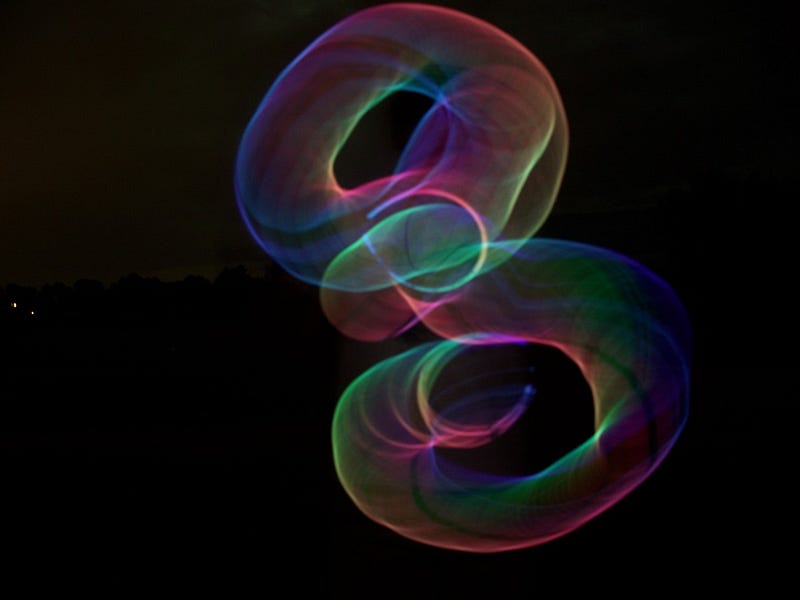
In my talk on the final day of the meeting, I argued that indeed physicists do in practice use undisclosed assumptions: aesthetic judgements that they use to select among approaches. Philosopher Elena Castellani recounts the history of string theory: “The theory was regarded as so beautiful and had such a compelling mathematical structure, obtained in agreement with consistency conditions and deep physical principles, that the intuition was that it had to be somehow related to the physical world.” But why should beauty be a valid criterion for assessment? The problem is highlighted by historian Helge Kragh who speaks about theories once considered beautiful but now considered wrong: the steady state universe, vortex theory, SU(5) grand unification.
For a workshop whose task is to evaluate the question of whether there are alternatives to string theory, the alternatives are underrepresented among the participants. While several string theorists are speaking, there is, besides Rovelli, nobody here speaking about other research approaches to quantum gravity; the most glaring omission is asymptotically safe gravity. There are also many multiverse skeptics present at the workshop, but few proponents of the idea.

String theorist Joe Polchinski, who meant to present his arguments in favor of the multiverse, unfortunately canceled his participation on short notice. His talk was instead presented by David Gross, and a writeup is now available on the arxiv. Gross himself does not like the multiverse idea, but he thinks it is good practice to present a point of view opposite of one’s own. Impersonating Polchinski, Gross argues that the probability that we live in a multiverse is 94%. The audience laughs. “It’s interesting,” insists Gross, not very convincingly. In his role of representing Polchinski, Gross strongly opposes the idea that string theorists work on string theory for sociological reasons.
Rovelli feels that the defensive tone of the talks at the workshop is misdirected: “Nobody doubts that string theory is interesting,” he says. But Gross has his worries: “The public is confused because there are a host of people who write blogs or books who attack string theory.” As one of the few bloggers who regularity writes about quantum gravity, this remark offends me. The reality is that the biggest task of science bloggers — like Peter Woit, Ethan Siegel and myself — has become to clean up after sloppy science journalism. Hype is a real problem. But it’s not the bloggers who are to blame for this.
The Munich workshop has put a spotlight on the worries of many physicists who work on foundational questions. It is an overdue debate, but the strategy that Gross was hoping for has not emerged. Instead, it has become clear that physicists and philosophers likewise are only just beginning to understand the problem; how to proceed when empirical confirmation is exceedingly remote is a question in need of further investigation. It seems likely that similar workshops will have to follow. For Slava Mukhanov however, the situation is clear: “Basing everything on experiment alone is wrong. Detaching everything from experiment is also wrong. The truth is somewhere in between.”
Massimo Pigliucci has also been writing up his experiences at this workshop; you can read parts I, II and III here.
Leave your comments on our forum, help Starts With A Bang! deliver more rewards on Patreon, and pre-order our first book, Beyond The Galaxy, today!




